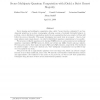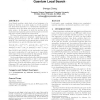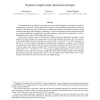587 search results - page 51 / 118 » Quantum computation and quantum information |
FOCS
2006
IEEE
14 years 4 months ago
2006
IEEE
Secret sharing and multiparty computation (also called “secure function evaluation”) are fundamental primitives in modern cryptography, allowing a group of mutually distrustfu...
COCO
2009
Springer
14 years 4 months ago
2009
Springer
One of the strongest techniques available for showing lower bounds on quantum communication complexity is the logarithm of the approximation rank of the communication matrix— th...
STOC
2006
ACM
14 years 10 months ago
2006
ACM
Local Search problem, which finds a local minimum of a black-box function on a given graph, is of both practical and theoretical importance to combinatorial optimization, complexi...
ICQNM
2008
IEEE
14 years 4 months ago
2008
IEEE
Coin flipping is a cryptographic primitive in which two spatially separated players, who in principle do not trust each other, wish to establish a common random bit. If we limit ...
STOC
2007
ACM
14 years 10 months ago
2007
ACM
The quantum adversary method is one of the most successful techniques for proving lower bounds on quantum query complexity. It gives optimal lower bounds for many problems, has ap...



